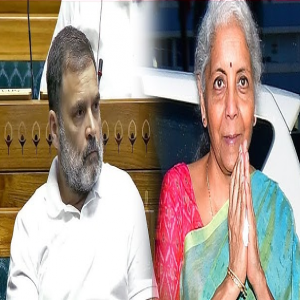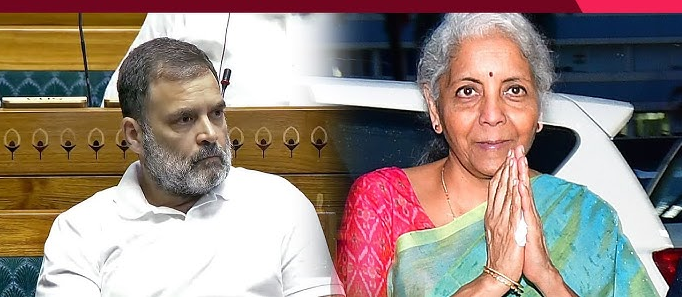

Participating in a debate on the Union Budget on July 29, 2024, Rahul Gandhi, the Leader of the Opposition (LoP) in Lok Sabha (Lower House of the Indian Parliament), in an aggressive, combative speech – his second as the LoP - made a scathing attack on the Budget and the Modi government's insensitivity to the sufferings of the people. It was an extraordinary speech of high intellect for a politician, punctuated with wit and humour, that left the Treasury Benches nervous and anxious, with several acrimonious exchanges between the Treasury and Opposition Benches.
He said: "Fear has pervaded every aspect of our country. Why is this fear spreading so deeply? Thousands of years ago in Haryana in Kurukshetra, Abhimanyu was trapped in a Chakravyuh (the multi-tiered circular formation in the epic Mahabharat in which the enemy was trapped) by six persons and killed. There is fear, and violence in Chakravyuh. Abhimanyu was killed in the Chakravyuh by six persons – Dronacharya, Karna, Kripacharya, Kritavarma, Ashwathama and Shakuni. In the 21st century, a new Chakravyuh is formed in India. Today's Chakravyuh is also controlled by six people: Narendra Modi, Amit Shah, Mohan Bhagwat, Ajit Doval, Gautam Adani, and Mukesh Ambani. What happened to Abhimanyu in the Chakravyuh is happening to our farmers, youth, women and medium and small businesses. There are three forces behind it: first the monopoly capital - financial power – that only two people should be allowed to own the entire wealth of India. Second the misuse of institutions and agencies like the CBI, ED and IT Department and the third the Political Executive. These three together are at the heart of the Chakravyuh, and they have devasted this country. There is nothing in the Budget to break this Chakravyuh. The sole aim of the Budget is to strengthen this framework and the deep State."
The parallel between the Chakravyuh of Mahabharat and that of present-day India is very striking. The present 'Lotus' shaped Chakravyuh is similar to that of the Chakravyuh that killed Abhimanyu. Rahul Gandhi said the Modi government has trapped the youth in a chakravyuh of unemployment and paper leaks, farmers in a chakravyuh of debt, the middle class in a chakravyuh of taxes, MSMEs in a chakravyuh of tax terrorism, jawans in a chakravyuh of Agnipath, and SCs, STs, OBCs and minorities in a chakravyuh of exploitation and injustice: "We break chakravyuhs - independence, Constitution, Green Revolution, MGNREGS are examples. You should not mistake India's youth for Abhimanyu. They are Arjun and will break free from this chakravyuh. You create chakravyuhs, and we break them." He said the INDIA bloc would break this Chakravyuh by carrying out the caste census and legally guaranteeing MSP for farmers. Rahul Gandhi insists on a caste census because it would enable the State to identify the extent of poverty and backwardness among various communities and then distribute the benefits of the State accordingly to ensure justice. It will present each demograhic's social, educational and economic profile to help formulate welfare schemes' policy.
He said that every religion has a formation like chakravyuh for misdeeds. "In Hinduism, 'Shiv ki Baaraat' is the opposite of chakravyuh. Anyone can join 'Shiv ki Baaraat', anyone from any faith. This fight is between 'Shiv ki Baaraat' and Chakravyuh. He made a distinction between Hinduism and Hindutva and asserted that the people in the Treasury Benches who claim to be Hindus do not understand Hinduism.
Throughout Rahul Gandhi's speech, Finance Minister Nirmala Sitharaman was smiling with inappropriate gestures, as if what the LoP was saying made no sense, unable to comprehend the analogy and the seriousness of the issues raised, displaying contempt and a degree of arrogance and insensitivity. This is reflected in her reply to the budget debate the next day. Her reply was more about the whataboutery of the past governments rather than answering the specific issues. She quoted a lot of figures to demonstrate that the Modi government during the past ten years did far better in all aspects than the previous Congress and the UPA governments. The figures quoted by her are questionable and need authentication. She reversed the table against the opposition and accused them of carrying a conspiracy against the Modi government: "Today, India's social fabric, parliamentary traditions, economy are severely attacked." Well, nothing could be further from the truth, as the people understand the reality is the other way round.
Anurag Thakur – former Minister in the Modi government known for his infamous remarks' goli maaro saalon ko' against the people protesting against the Citizens (Amendment) Act (CAA) 2019 in Delhi – responding to the Budget debate had abused Rahul Gandhi: "Jiski jaat ka pata nahin, woh ganana ki baat karta hai" (The person whose caste is not known talks about census). It is an outright insult to the LoP that demonstrates a lack of civility. When Akhilesh Yadav questioned how anyone could ask about a person's caste in the House, Jagadambika Pal, who was chairing the proceedings, said nobody should ask about anyone's caste in the House and that he would expunge the remark. And yet, it is quite demeaning and shocking that Narendra Modi, instead of rebuking Anurag Thakur, was quick to applaud him: "This speech by my young and energetic colleague Anurag Thakur is a must hear. A perfect mix of facts and humour, exposing the dirty politics of the INDI Alliance". This is how he has been vitiating the atmosphere himself by promoting and encouraging a toxic, poisonous narrative to capture power and remain in power. This itself is an example of how India is entrapped in the Chakravyuh of the Modi government.
Rahul Gandhi has emerged as a confident Opposition Leader, articulating and communicating his views very effectively. As Shashi Tharoor says, "He is more accessible to everyone. He is also hands-on as the LoP. The body language and the way he is functioning are conveying very strongly within the party, to allies, and to the BJP that he is in charge and willing to take them (BJP) on."